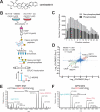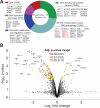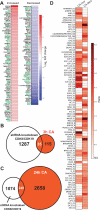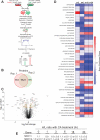Identification of Mediator Kinase Substrates in Human Cells using Cortistatin A and Quantitative Phosphoproteomics
- PMID: 27050516
- PMCID: PMC4833653
- DOI: 10.1016/j.celrep.2016.03.030
Identification of Mediator Kinase Substrates in Human Cells using Cortistatin A and Quantitative Phosphoproteomics
Abstract
Cortistatin A (CA) is a highly selective inhibitor of the Mediator kinases CDK8 and CDK19. Using CA, we now report a large-scale identification of Mediator kinase substrates in human cells (HCT116). We identified over 16,000 quantified phosphosites including 78 high-confidence Mediator kinase targets within 64 proteins, including DNA-binding transcription factors and proteins associated with chromatin, DNA repair, and RNA polymerase II. Although RNA-seq data correlated with Mediator kinase targets, the effects of CA on gene expression were limited and distinct from CDK8 or CDK19 knockdown. Quantitative proteome analyses, tracking around 7,000 proteins across six time points (0-24 hr), revealed that CA selectively affected pathways implicated in inflammation, growth, and metabolic regulation. Contrary to expectations, increased turnover of Mediator kinase targets was not generally observed. Collectively, these data support Mediator kinases as regulators of chromatin and RNA polymerase II activity and suggest their roles extend beyond transcription to metabolism and DNA repair.
Keywords: CDK8-Mediator; MED13; MED13L; Mediator; SILAC; SIRT1; cholesterol.
Copyright © 2016 The Authors. Published by Elsevier Inc. All rights reserved.
Figures





Similar articles
-
Transcriptional Responses to IFN-γ Require Mediator Kinase-Dependent Pause Release and Mechanistically Distinct CDK8 and CDK19 Functions.Mol Cell. 2019 Nov 7;76(3):485-499.e8. doi: 10.1016/j.molcel.2019.07.034. Epub 2019 Sep 5. Mol Cell. 2019. PMID: 31495563 Free PMC article.
-
Regulatory functions of the Mediator kinases CDK8 and CDK19.Transcription. 2019 Apr;10(2):76-90. doi: 10.1080/21541264.2018.1556915. Epub 2018 Dec 26. Transcription. 2019. PMID: 30585107 Free PMC article. Review.
-
Mediator kinase inhibition further activates super-enhancer-associated genes in AML.Nature. 2015 Oct 8;526(7572):273-276. doi: 10.1038/nature14904. Epub 2015 Sep 28. Nature. 2015. PMID: 26416749 Free PMC article.
-
HIV Transcription Is Independent of Mediator Kinases.AIDS Res Hum Retroviruses. 2019 Aug;35(8):710-717. doi: 10.1089/AID.2019.0039. Epub 2019 May 29. AIDS Res Hum Retroviruses. 2019. PMID: 31044597 Free PMC article.
-
Molecular and in vivo Functions of the CDK8 and CDK19 Kinase Modules.Front Cell Dev Biol. 2019 Jan 14;6:171. doi: 10.3389/fcell.2018.00171. eCollection 2018. Front Cell Dev Biol. 2019. PMID: 30693281 Free PMC article. Review.
Cited by
-
CDK8/19 inhibition induces premature G1/S transition and ATR-dependent cell death in prostate cancer cells.Oncotarget. 2018 Feb 6;9(17):13474-13487. doi: 10.18632/oncotarget.24414. eCollection 2018 Mar 2. Oncotarget. 2018. PMID: 29568371 Free PMC article.
-
Global hyperactivation of enhancers stabilizes human and mouse naive pluripotency through inhibition of CDK8/19 Mediator kinases.Nat Cell Biol. 2020 Oct;22(10):1223-1238. doi: 10.1038/s41556-020-0573-1. Epub 2020 Sep 28. Nat Cell Biol. 2020. PMID: 32989249
-
Exploitation of the Mediator complex by viruses.PLoS Pathog. 2022 Apr 21;18(4):e1010422. doi: 10.1371/journal.ppat.1010422. eCollection 2022 Apr. PLoS Pathog. 2022. PMID: 35446926 Free PMC article. No abstract available.
-
CDK8 and CDK19 act redundantly to control the CFTR pathway in the intestinal epithelium.EMBO Rep. 2023 Feb 6;24(2):e54261. doi: 10.15252/embr.202154261. Epub 2022 Dec 22. EMBO Rep. 2023. PMID: 36545778 Free PMC article.
-
Mediator Kinase Phosphorylation of STAT1 S727 Promotes Growth of Neoplasms With JAK-STAT Activation.EBioMedicine. 2017 Dec;26:112-125. doi: 10.1016/j.ebiom.2017.11.013. Epub 2017 Nov 21. EBioMedicine. 2017. PMID: 29239838 Free PMC article.
References
Publication types
MeSH terms
Substances
Grants and funding
LinkOut - more resources
Full Text Sources
Other Literature Sources
Molecular Biology Databases

